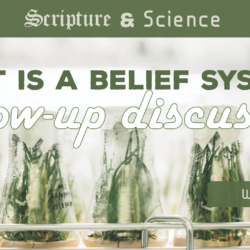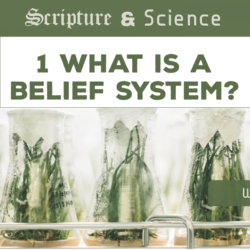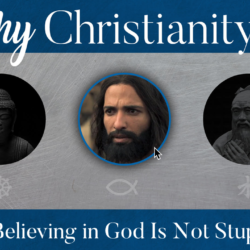Apologetics 14: Science (Objection 2)
Although our culture commonly pits science and faith against each other, as if they’ve been at war for centuries, the truth is that faith gave birth to science. In this lecture, you’ll learn about some of the main science objections that skeptics bring against Christianity and how to respond to them.
If you would like to take this class for credit, please contact the Atlanta Bible College so you can register and do the necessary work for a grade.
Notes:
Why Isn’t God’s Existence Obvious?
- no scientific test you can use to prove God’s existence
- “Confronted with the Almighty, [Bertrand Russell] would ask, ‘Sir, why did you not give me better evidence?'”[1]
- Isaiah 45.15 talks about the hiddenness of God
- Dembski’s point in In Defense of the Bible ch 14 is that
- God is hidden enough not to coerce belief
- God is visible enough to be found by those who seek him
- “This seems to be the pattern in God’s revelation of himself: provide enough evidence to convince those who are honestly seeking truth but not so much evidence as to force belief on those who prefer to believe a lie.”[2]
Theists Pioneered Most Branches of Science
- belief in God led to
- belief in rational universe
- belief that external world cohered w/ our observation/perception
- belief that God used stable physical laws
- belief that studying creation was a good b/c it indirectly extolled the Creator
- Copernicus, Kepler, Newton, James Clerk Maxwell
“To know the mighty works of God, to comprehend His wisdom and majesty and power; to appreciate, in degree, the wonderful workings of His laws, surely all this must be a pleasing and acceptable mode of worship to the Most High, to whom ignorance cannot be more grateful than knowledge.” –Nicolaus Copernicus, the mathematician and astronomer (1473-1543) who formulated a heliocentric model of the universe
“…Those laws are within the grasp of the human mind. God wanted us to recognize them by creating us after his own image so that we could share in his own thoughts.” –Johannes Kepler, the German mathematician and astronomer who discovered the laws of planetary motion
“If you study science deep enough and long enough, it will force you to believe in God.” —Lord William Kelvin, who was noted for his theoretical work on thermodynamics, the concept of absolute zero and the Kelvin temperature scale based upon it.
“In the absence of any other proof, the thumb alone would convince me of God’s existence.”
“I have a fundamental belief in the Bible as the Word of God, written by those who were inspired. I study the Bible daily.”—Sir Isaac Newton, who is widely regarded to have been the greatest scientist the world has ever produced.
“There can never be any real opposition between religion and science; for the one is the complement of the other. Every serious and reflective person realizes, I think, that the religious element in his nature must be recognized and cultivated if all the powers of the human soul are to act together in perfect balance and harmony. And indeed it was not by accident that the greatest thinkers of all ages were deeply religious souls.” —Max Planck, the Nobel Prize winning physicist considered to be the founder of quantum theory, and one of the most important physicists of the 20th century, indeed of all time.
“The gift of mental power comes from God, Divine Being, and if we concentrate our minds on that truth, we become in tune with this great power.” –Nikola Tesla, the inventor and futurist scientist known for numerous inventions, but best known for his contributions to the design of the modern alternating current (AC) electrical supply system.
“I have looked into most philosophical systems and I have seen that none will work without God.”
“Science is incompetent to reason upon the creation of matter itself out of nothing. We have reached the utmost limit of our thinking faculties when we have admitted that because matter cannot be eternal and self-existent it must have been created.” —Physicist and mathematician James Clerk Maxwell, who is credited with formulating classical electromagnetic theory
Biblical Culture
chronological snobbery: thinking you’re better than people who lived a long time ago
- how do people in our culture feel about old people
- how do people in our culture feel about people from the year 1075
- no grasp of electricity, internal combustion, computers, or modern building techniques
- yet, in 1075 Anselm of Cantebury wrote the Monologion
- ancient Ephesos had running water throughout city, aqueducts brought water in from far away, sewers, public bathrooms, public baths (caldarium, tepidarium, frigidarium), rich people had heated floors
- had to read Plato in college, in Greek: it sometimes took hours to translate one sentence, could look up every word and still have no idea
- here’s a guy who could sit down and just think
- he could give you a reasoned account for why you should do the right thing even when nobody is watching (The Republic)
- are we getting smarter?
- accumulated knowledge
- which of you could make a toaster from scratch? a light bulb? a shovel?
- which of you could even survive w/o at least a knife or matches?
- we have more time and access to information than ever before
- what do we do with it?
- rot our brains w/ video games
- binge on TV shows and movies
- distract ourselves w/ social media and the trivialities of our age
- when’s the last time you meditated on the big questions?
- their attention spans were longer and their memories were better
- probably the same average intelligence or maybe they were smarter
charitable reading
- skeptics cherry pick a verse here and a verse there to build a case against the bible
- Prov 26.4 Answer not a fool according to his folly, lest you be like him yourself.
- Prov 26.5 Answer a fool according to his folly, lest he be wise in his own eyes.
- is this a genuine contradiction?
- sometimes it’s good to answer a fool and sometimes it’s better to ignore him
- whenever reading someone, you should read charitably
phenomenological reading
- how many of you believe in sunrises and sunsets
- yet you also believe the sun doesn’t rise or set, right?
- it’s the earth rotating that makes it appear like the sun rises
- perspective
- the people who wrote the bible spoke from the perspective of how phenomena appear from earth (phenomenological language)
- they are not scientists in our modern sense
- to read them in such a way would be like criticizing a rap song for bad grammar
naturalism as a worldview
- hard to believe in demons, miracles, prophecy of the future
- but naturalism is extremely difficult to prove
- yet it colors how someone views everything
- yet, most people throughout history and most people today do not subscribe to naturalism
- is everyone really deluded?
Divine Intervention Breaks the Laws of Physics?
- earthquake causes a lamp to fall
- you reach out your hand and catch it
- did you break the law of gravity?
- no! you merely intervened
No Need for God
- believe in God only b/c you can’t explain
- how everything came to be
- why we should live virtuously
- your purpose/meaning
- fear of death
- God of the gaps
- our arguments for God are not based on a lack of understanding, but they are positive (teleological, cosmological, ontological)
Religion is Bad for Society
- crusades, inquisition, persecuting Galileo, etc.
- atheism produces horrible atrocities as well
- Pol Pot: killed 3 million
- Nazi genocide based on social Darwinism: killed 11-14 million
- Mao Zedong: killed 30 million
- Karl Joseph Stalin: killed 50 million
- compared to
- Salem Witch hunt: killed 33
- Spanish Inquisition: killed 5-10,000 (over 2 centuries)
- crusades: killed at most 9 million (over 220 years)
Age of Earth
- bible teaches the earth is 6,000 years old
- science teaches it is 3.5? billion years old
- how do you get an age for the earth?
- radiometric dating assumptions
- uniformitarianism (steady process)
- potato peeling example
- known original conditions (no daughter particles in the originals)
- nothing added or taken away (no leeching)
- use meteorites, but these don’t tell you the age of the earth and they are likely significantly affected by extreme heat conditions
- uniformitarianism (steady process)
- what about global chronometers?
- salinization of the ocean (not salty enough)
- mud on the sea floor (not deep enough)
- magnetic field decays too fast (going back it would be as strong as a star 10,000 years ago)
- layers aren’t so simple
- bent strata
- injected sandstone
- polystrate fossils
- human artifacts like hammers and sandal prints found in billion year old rock
- helium concentration in atmosphere (should be much more from Uranium -> Lead decay)
- population statistics (only 1 million alive in 2,000 bc…works well w/ a flood in 3,000 bc)
- moon dust (should have tons of dust from meteor impacts)
- polonium halos in granite (shouldn’t be there unless rock solidified instantly)
- radiometric dating assumptions
Evolution
- theistic evolution: belief that God used evolution to create
- defined
- genetic mutation
- natural selection (survival of the fittest)
- irreducible complexity: systems that do not provide any advantage unless all of the parts are assembled and functioning
- mouse trap
- eye
- ecological balance
- Cambrian explosion
- first life: evolution’s number one difficulty
- Darwin assumed
- cell was very simple blob
- transitional links would gradually fill in fossil record
- biogenetic law: life comes only from life
- chirality (DNA must be right handed)
- yet amino acids occur naturally in even proportions of left and right
- need 100,000 amino acids to instantiate at the right place/time and all be left handed
- Darwin assumed
- similarities between species
- evidence of common design or common ancestry
- skateboards and cars have 4 wheels
- doesn’t mean skateboard evolved into a car over millions of years
- just means wheels are a common design we use for transport
- evidence of common designer (like cars from same manufacturer)
- vestigial organs
- often just don’t understand function (used to remove tonsils)
- evidence of de-evolution since they don’t work anymore
- embryonic recapitulation
- Ernst Haeckel
- faked wood cuts (1868) to make it look like human embryo traced its evolutionary history
- single cell=>multiple cell=>fish=>amphibian=>reptilian=> mammalian
[1] Leo Rosten, Saturday Review/World (February 23, 1974)
[2] Dembski, p. 354.






